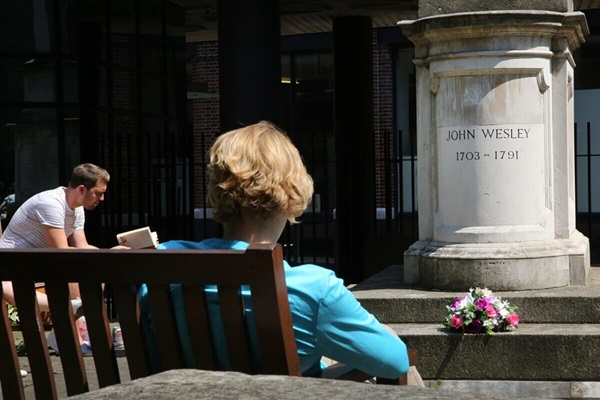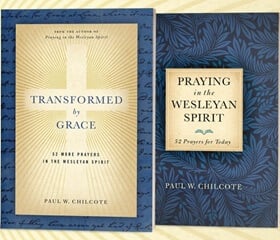“Prayer for the Wesleys is really the bedrock of the Christian life,” says Paul Chilcote, author, pastor, theologian and Wesley scholar.
“One of my mentors, Mark Gibbard, always said, ‘God is just always waiting eagerly to be with us.’ If we approach time with God not out of duty or obligation, but the idea that God just can’t wait for me to show up – he wants to be with me, to help, guide, forgive, reconcile and restore me – it becomes a place you really want to be.”
Nearly 25 years ago, Chilcote began a journey to distill the essence of John Wesley’s sermons into accessible prayers. He brings the original 18th-century English into contemporary language so that readers can better engage with Wesley’s teaching and encouragement.
Who were the Wesleys?
John Wesley founded the Methodist movement in England in the mid-1700s. His younger brother, Charles, was a formative leader in the movement. Their teaching, theology and vision for the Methodists gave birth to precursor Christian denominations that eventually became The United Methodist Church, which now has approximately 10 million members around the world.
“Most of his sermons, Wesley never preached. They’re really sermonic essays and were meant to be read,” he explains.
With the help of Chilcote’s books, Praying in the Wesleyan Spirit and Transformed by Grace, readers can pray alongside both John and Charles Wesley.
Prayer is central to everything
“I think if you were to ask John or Charles, 'Why is [prayer] so central?’, they would say that the essence of the Christian life is abiding in Christ,” says Chilcote. “And that abiding has a sense of intimacy connected with it. It has a sense of rest, as well as of resting in God and being in a direct relationship with God through the power of the Spirit in our lives.
“So, prayer becomes for them the heartbeat of their faith. Everything they do is saturated with prayer.”
The Wesleys learned prayer practices from their parents, Samuel and Susannah, who would gather their ten children for family prayer each morning and evening, using the Book of Common Prayer.
“Maybe all of life is bookended in that way with prayer, but the middle is also surrounded and encouraged by prayer. I love the Eastern Orthodox tradition, the so-called breath prayer, where you pray with your breathing. I think this is how prayer was for the Wesleys, it was like their breath, and it was all related to intimate relationship with God,” shares Chilcote.
Hymns invite a different connection
While John Wesley’s sermons are vital to our denomination’s heritage, Chilcote didn’t want readers to forget about the important contributions of Charles Wesley, who wrote 9,000 hymns and poems. A related hymn accompanies each sermon in both devotional books.
“Prayers provide a particular kind of medium to be in dialogue with God. Hymns, on the other hand, engage a different part of our brain. They’re more emotive, they’re poetic. They provide an opportunity to be with God, to walk with God in a way that’s different from reading or praying a prayer.
Take a look into the books
Chilcote’s first book in the series, Praying in the Wesleyan Spirit, contains prayers from Wesley’s early, standard sermons, which focus on doctrine. The second book, Transformed by Grace, focuses on later sermons, when Wesley’s subject matter was more about spirituality.
Here is an excerpt from Transformed by Grace’s prayer 41, titled “Filled with Light,” which encourages us to keep our lives focused on God:
Illuminating God,
Two wings lift my soul to heaven: simplicity with regard to my intentions and purity with regard to my affections. If I focus my intention and love on you, your Spirit lifts me into the light and you fill me with all holiness and happiness. My soul soars when I think about what it means to be a real, inward, scriptural Christian, conformed in heart and life to your will and way.
Each book holds 52 devotionals; both are available from Upper Room Books.
“I think song is at the very heart of life. There’s a poetry to it that excites, challenges and inspires a part of us that the other doesn’t, and I wanted to provide something for different kinds of learners,” explains Chilcote.
A growing focus on love
Chilcote has been able to observe John Wesley’s spiritual growth through his research. He says, “The more I worked with this material, the more I discovered it seemed to be oriented increasingly toward love and happiness.”
A Ph.D. student that Chilcote supervised at Cambridge University found that the five Wesley sermons in which happiness is most dominant come from Wesley’s later years.
Chilcote observes, “The older John Wesley becomes, the longer he’s been engaged in his pilgrimage of faith with Christ, the more important love and happiness – meaning blessedness – becomes for him.
“And if you’re going to summarize Charles Wesley’s huge body of poetic material, the central theme there from beginning to end is ‘love divine, all loves excelling.’
“I think [the centrality of love in Methodism] is increasingly unique. What if we made the decision to become known as the most loving community? So that if people who are struggling, and just need to be loved, knew the place to go is The United Methodist Church?
“Part of my creating these kinds of resources is the hope that they might shift our trajectory in that kind of direction. That by praying, and by figuratively singing our story as Christians, love gets more and more deeply embedded in our lives.”
The lifelong journey of faith
While selecting sermons and hymns for the books, Chilcote saw confirmations of insights he’d made over the years.
“Wesleyan theology is very broad, it’s drawn from multiple sources,” he shares. “There is nothing new, in a sense, in Wesley. It’s all old, solid spirituality and theology, but it’s the way he combines things and holds it together that makes Wesleyan theology unique.
“The Wesleyan way is a both/and way, not an either/or way. Their theology, their spirituality, is holistic, it’s not segmented. Always holding things together and building bridges was a central theme.”
Many Christians today see salvation as a point in time, a decision that was made, but that is not what the Wesleys believed. Chilcote explains, “For the Wesleys, the [Christian faith] is an adventurous journey. That’s what the Christian life is all about. And the destination is the fullest possible love of God.”
Laura Buchanan works for UMC.org at United Methodist Communications. Contact her by email.
This story was published on August 18, 2025.






